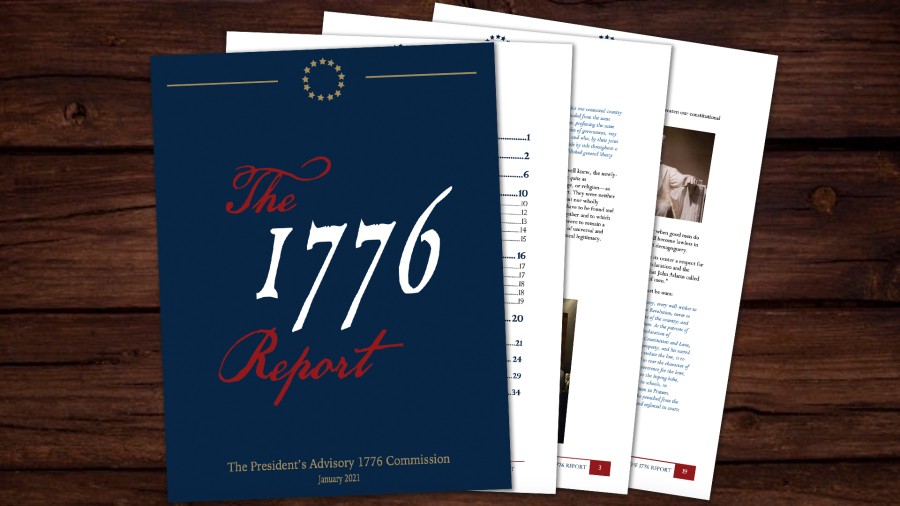Chicago State Prof Slams 1776 Report For Ignoring The Full Story Of Slavery In America
By Esther Yoon-Ji Kang

Chicago State Prof Slams 1776 Report For Ignoring The Full Story Of Slavery In America
By Esther Yoon-Ji KangAmong President Joe Biden’s first actions in office is an executive order to dissolve the 1776 commission, the panel set up by former President Donald Trump as a rebuttal to U.S. schools teaching a more accurate history curriculum around slavery in America.
On Monday, the commission had released The 1776 Report, a document intended to serve as a rebuttal to The New York Times Magazine’s 1619 Project, which reframes American history by focusing on the consequences of slavery and the contributions of Black Americans.
A day after the Trump administration dropped The 1776 Report, WBEZ spoke with Chicago State University history professor Lionel Kimble Jr. about the controversial report. Kimble is also president of the Chicago branch of the Association for the Study of African American Life and History. Below is a transcript of the conversation, edited for clarity and brevity.
As a historian, what was your initial reaction after reading the 1776 Report?
I went between laughter to confusion to utter disdain. I had this visceral reaction as I read it, and I just was shaking my head through most of it.
Ironically enough, today was the first day of class. I’m teaching a class on Black Chicago history. I said [to my students], “Download this document, and we’re going to talk about it on Tuesday, in our third class, about how not to do history.”
[The 1776 Report] was ahistorical; it had no basis or standing in historical fact. It made these intellectual leaps that weren’t supported by anything. And I really felt like I wasted my time reading it.
What were some of the problems you saw with the report?
I thought it was very problematic for a number of different reasons. The first one was that it had no historians on the committee. There were a number of politicians and political supporters and donors of Donald Trump. There are administrators in very, very conservative universities. There’s no one with any background in history and constitutional studies. I’m not even sure if they have any constitutional lawyers on this.
I’m following in the tradition of Carter G. Woodson. He wrote the story of the so-called Negro into American history because it tells the fuller story. The 1776 Project seeks to ignore this fuller story and focuses on this narrative of American exceptionalism, [that] Americans did no wrong, [that] race and gender and ethnicity mean nothing because people who harp on those ideas are just dissatisfied leftists who hate America.
After the report was released, the reactions largely fell along political lines. What does this debate say about this moment in American history?
By and large, America, to me, is a history wasteland. We throw things away, we throw old buildings away, we throw old history away, we don’t talk about things that are painful, things that are problematic, things that are controversial, because it doesn’t make Americans feel good about the atrocities that we’ve done as a nation.

In so many other countries … I’ve been thinking about Germany for example. Germany faced their demons; they faced the Nazi history … and I think they came out better for it. It’s not perfect, but at least they came to a realization about who they were as a people. South Africa did the same thing after post-apartheid South Africa. They looked at their history, warts and all. They said this was horrible what we did to each other. And if we don’t get our act together in this country, have these same hard conversations, we’re never gonna get any better. It doesn’t make a difference what we’re teaching our children in school — we’re never going to get any better.
What do you make of the timing of the report’s release, on the Martin Luther King Jr. holiday?
This was a slap in the face. For this document to come out when we’re celebrating a person who saw the potential greatness of America [but] that it hadn’t quite lived up to that, and to put this document out to say that America was perfect — I think that casts a long shadow on King’s assassination. It tells people who believe in King and believe the things that he stood for that he died for nothing, and if he just would have waited … eventually, we would have gotten there — we would’ve gotten to freedom and equality. And for me, this document does a great disservice to his memory and legacy.
Esther Yoon-Ji Kang is a reporter on WBEZ’s Race, Class and Communities desk and WBEZ’s Education desk. Follow her on Twitter @estheryjkang.